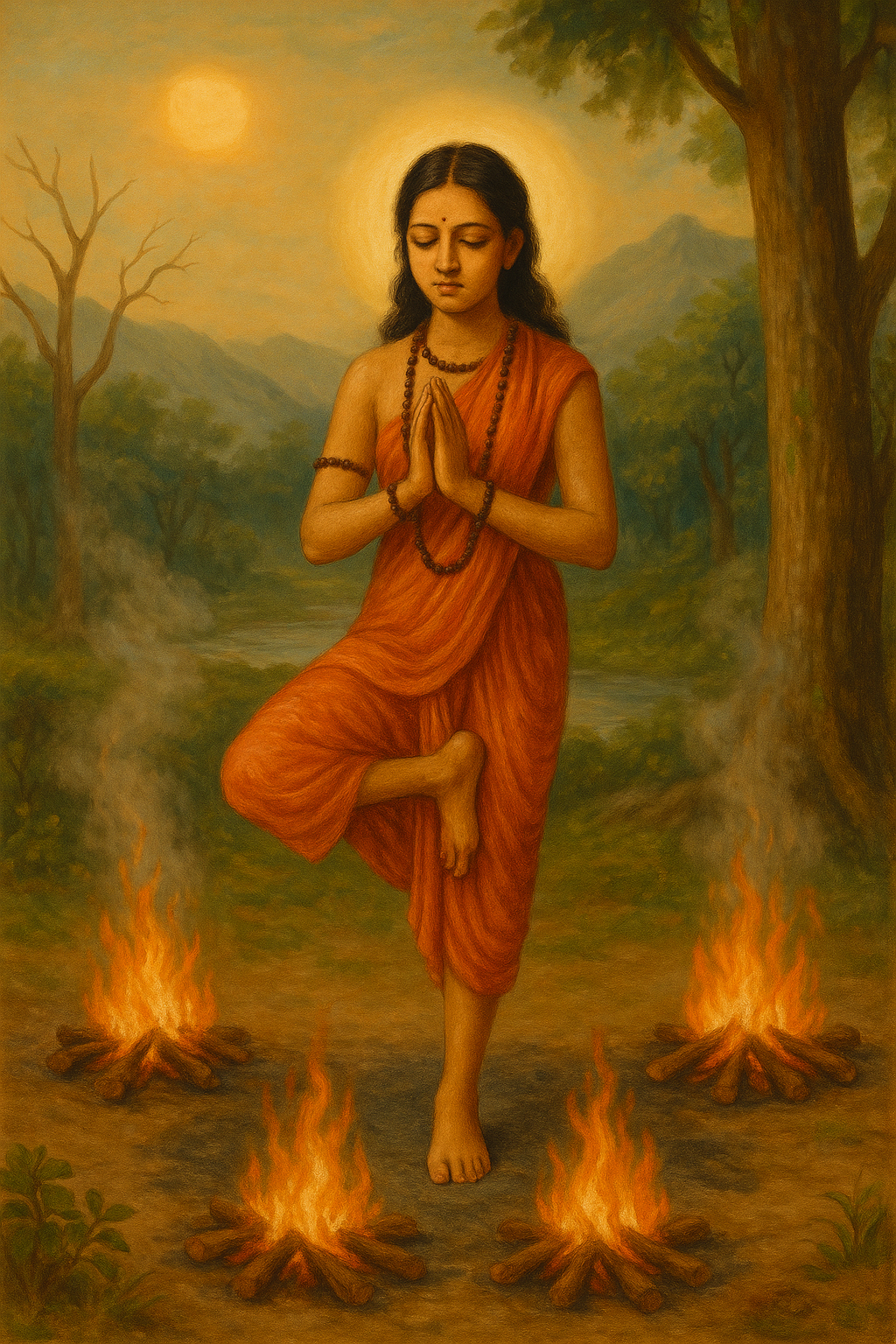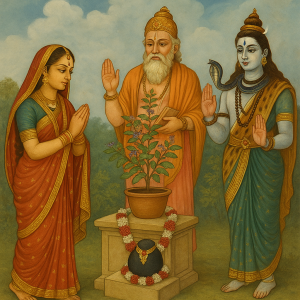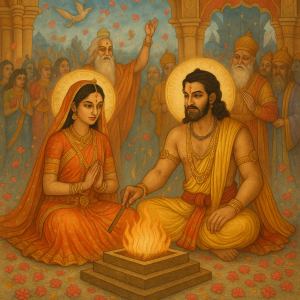The Unshakable Resolve
From the very moment of her divine birth, Tulasī Devī displayed an extraordinary determination. She resolved to attain Lord Kṛṣṇa as her husband and chose the sacred mountainous region of Badarikāśrama as the place to perform severe austerities.
Many elders and well-wishers tried to dissuade her, offering comfort and alternative paths, but her heart was firmly fixed. Her one-pointed desire was to worship the Lord until He appeared before her and accepted her as His consort.
Lifetimes of Austerity
For one hundred thousand celestial years, Tulasī remained in the forest, undergoing unimaginable penances.
- In the scorching summer, she sat surrounded by four blazing fires, with the blazing sun overhead.
- In the freezing winter, she submerged herself in icy waters.
- During the monsoon season, she remained in the cremation grounds, exposed to relentless rains.
Her diet reflected her gradual detachment from all material dependency:
- For 20,000 years, she ate only fruits and drank water.
- For the next 30,000 years, she survived solely on dry leaves.
- For 40,000 years, she lived by inhaling air alone.
- And for the final 10,000 years, she gave up even that, standing motionless on one leg without eating or drinking anything at all.
Lord Brahmā Appears
Finally, seeing the intensity of her devotion, Lord Brahmā descended from the sky on his celestial swan. Tulasī, with folded palms and tears in her eyes, offered her full obeisances, confident that the Lord had come to grant her the boon she had been praying for.
Brahmā, with compassion and affection, addressed her:
“O blessed one, ask from me a boon—be it devotion to Lord Hari, freedom from old age or death, or even direct service to the Lord. I shall grant it.”
A Painful Past Remembered
Tulasī replied with humility, “O Lord, please do not be surprised by my request. I will speak truthfully, for You already know all things. My name is Tulasī. In my previous birth, I was a cowherd girl in Goloka Vṛndāvana, and I served Śrīmatī Rādhārāṇī, the dearmost beloved of Lord Kṛṣṇa. I was Her close companion and a partial expansion of Her divine energy.”
She then described a critical event: “One day, in the same spot where the rāsa-līlā had taken place, Lord Kṛṣṇa embraced me intimately. Overwhelmed with joy, I fainted. At that very moment, Śrī Rādhārāṇī arrived and saw me in that state. Enraged, She chastised Kṛṣṇa and cursed me: ‘You wretched girl! Go take birth on Earth as a human being!’”
Tulasī continued, “After this, Kṛṣṇa comforted me and said, ‘When you are born on Earth, if you perform severe austerities, Lord Brahmā will appear to you and bless you with the chance to marry Nārāyaṇa, My four-armed expansion.’ Kṛṣṇa then vanished, and out of fear of Rādhārāṇī, I left Goloka and was born here in the royal family of King Dharmadhvaja.”
She concluded, “My desire, therefore, is to marry that serene and beautiful Lord Nārāyaṇa.”
A Twist in Destiny
Lord Brahmā listened carefully and said, “O Tulasī, your desire shall indeed be fulfilled. But there is another part to your destiny. In Goloka, one of Kṛṣṇa’s cowherd boyfriends, Sudāmā, who is also a partial expansion of Him, was deeply attached to you. But due to fear of Rādhārāṇī, he did not express his feelings.”
He explained further, “That same Sudāmā has now taken birth on Earth among the Dānavas (demons), cursed by Śrī Rādhā, and is now known as Śaṅkhacūḍa. Just as you remember your past life, so does he. He has performed great austerities to gain you as his wife. I wish to grant him that desire.”
“Later on,” Brahmā added, “by a special arrangement of Providence, you will indeed marry Lord Nārāyaṇa. However, as part of that arrangement, Nārāyaṇa will curse you, and you will transform into a sacred tree—the world-purifying Tulasī plant. You will become the most sanctified of all flowers, and your leaves will be dearer to Nārāyaṇa than His own life. No worship of the Lord will be considered complete without your leaves. In Vṛndāvana, you will take the form of a sacred tree known as Vṛndāvanī, and your leaves will be used by the cowherd men and women to worship Śrī Hari. As the presiding deity of the Tulasī plant, you will always be in the association of Kṛṣṇa, the Supreme Cowherd Boy.”
A Hidden Longing for Kṛṣṇa
Hearing this, Tulasī smiled shyly and replied, “O Lord, I shall speak the truth. Although I have been praying to marry Lord Nārāyaṇa only because Kṛṣṇa instructed me to do so, my real desire lies elsewhere. My heart is still bound to that moment in Goloka when I experienced intimate contact with Kṛṣṇa. That encounter was interrupted so suddenly by Rādhārāṇī’s curse, and the longing it left in me remains unfulfilled. Thus, I desire Kṛṣṇa, not Nārāyaṇa.”
“But please,” she added humbly, “grant me one more boon: may I be freed from my fear of Śrī Rādhārāṇī.”
Pleased by her sincerity, Lord Brahmā said, “So be it.” He then initiated her into the sixteen-lettered mantra of Śrī Rādhā, taught her the proper worship of Rādhārāṇī, and blessed her. Then he disappeared.
Worshiping Rādhārāṇī
Following Brahmā’s instruction, Tulasī Devī began to worship Śrīmatī Rādhārāṇī with deep devotion. She engaged herself fully in this worship for twelve years. Her austerities bore fruit. She attained a divine benediction: the mercy of Rādhārāṇī Herself, who now approved of Tulasī’s intimate connection with Kṛṣṇa.
Now filled with joy and inner fulfillment, Tulasī reflected on her long penance. The bitterness and hardship of the past now appeared sweet, for they had brought her to this supreme result. She had earned what others could not even dream of attaining.
Desire Awakens
Tulasī was in the prime of her youth, her body radiant and fragrant. One night, after completing her daily rituals and taking her food and drink, she lay down on a soft bed smeared with sandalwood paste and adorned with flower petals. Her mind was peaceful and filled with bliss.
But then, unseen and unheard, Kāma-deva (Cupid), the god of love, arrived. Seeing Tulasī’s perfect devotion and beauty, he became eager to stir her desires. He shot five flower-arrows at her heart.
Though lying on a cooling bed, her body began to feel like it was burning. Her hair stood on end with excitement, her eyes turned red, and her limbs trembled. Her sleep was disturbed by feverish dreams—visions of a beautifully dressed youth who embraced and kissed her with great affection.
One moment he vanished, and the next he reappeared. In her dream, she cried out in longing:
“O Lord of my heart! Where are you going? Please don’t leave!”
When she awoke, her pillow was soaked with tears. Her heart throbbed with a mysterious ache—the ache of love for her beloved Lord.
Lessons to Be Learned
1. Steadfast Devotion Bears Supreme Results
Tulasī Devī’s unwavering resolve to attain the Lord—even over millions of years of penance—is the hallmark of real bhakti. Śrīla Prabhupāda taught that determination in devotional service is a symptom of love. Even if the Lord tests us, we must not give up.
2. Tapasya Without Bhakti Is Dry—Tapasya with Love Is Sweet
Tulasī’s austerities were not performed out of ego, renunciation, or ambition. They were performed for one reason only: to serve and attain the Lord. This is the essence of bhakti-yoga.
3. Kṛṣṇa Knows the Heart’s Secret Desires
Though Tulasī was praying for Nārāyaṇa, her true longing was for Kṛṣṇa. The Lord always knows our inner motives, even when our words say something else. Śrīla Prabhupāda emphasized, “The Lord is in your heart and knows everything.”
4. Even a Curse Can Become a Blessing for a Devotee
Tulasī’s curse to fall to Earth became the cause of her becoming the most worshiped plant in the universe. Kṛṣṇa always turns the devotee’s suffering into glory. Nothing is ever lost in Kṛṣṇa consciousness.
5. Rādhārāṇī Is the Supreme Approver of Kṛṣṇa’s Intimate Associates
Even Kṛṣṇa cannot grant intimacy without Śrīmatī Rādhārāṇī’s blessing. This teaches us the paramount position of Rādhā-devī in the spiritual world. Śrīla Prabhupāda often said, “We cannot approach Kṛṣṇa without the mercy of Rādhārāṇī.”
6. The Fire of Separation Purifies the Soul
Cupid’s attack on Tulasī symbolized the awakening of divine longing—the intense feelings of separation that transform material desire into spiritual love. For the devotee, even longing becomes a sacred offering.



